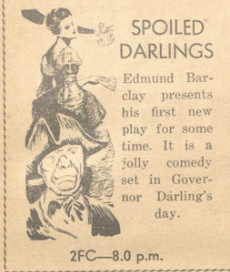Daybreak is a 1938 Australian play by Catherine Shepherd.
Stockade is a 1942 radio play by Richard Lane who regarded it as one of his most significant works. It is a verse drama about the Eureka Rebellion. It tells the story though Bridget Shannahan who was on Bakery during the Stockade period. She was a real person, grandmother to Lane's then-wife.

The Fortunes of Richard Mahony is a 1949 Australian radio drama by Edmund Barclay. It was adapted from the novel of the same name and ran for almost a year as a daily serial.

Spoiled Darlings is a 1940 Australian romantic comedy radio play by Edmund Barclay that was broadcast nationally on the ABC.
Stranger Come In is a 1951 Australian radio drama by Max Afford. It was unusual for Afford in that it dealt with contemporary social problems.
The Harp in the South is a 1951 Australia radio serial adapted by Tony Scott Veitch from the novel of the same name by Ruth Park. It featured many leading actors of the time including Grant Taylor, Dinah Shearing and Reg Goldsworthy.
The Sundowner is an Australian radio series starring Chips Rafferty as a swagman.
Early in the Morning is a 1946 Australian radio feature by Ruth Park about Abel Tasman.

Soldiers Three is a 1943 Australian radio serial by Edmund Barclay. It was commissioned for the Australian war effort to emphasise the contribution of Australian soldiers.

The Mysterious Mr. Lynch is a 1939 Australian radio serial by Max Afford. It starred Peter Finch as its detective hero, Jeffrey Blackburn.
Space Explorers is a 1942 Australian radio serial by Max Afford. It was a science fiction serial for children. The serial was the first radio role for Madge Ryan.
Forgotten Men is a 1944 Australian radio serial by Edmund Barclay. It was set in Manchukuo at the start of the war.
The Faithful Heart is a 1948 Australian radio serial by Edmund Barclay. It was set during the War of the Roses.
Small Town is a 1946 Australian radio play by Kathleen Carroll. It won a £50 prize as one of the two runners-up in the Lux Radio Theatre Play Competition. She was inspired to write it after visiting an old mining town.
Spiegel the Cat is a 1952 Australian radio play by David Martin. It was adapted from Spiegel the Cat, a story from the Swiss writer Gottfried Keller.
The Last Foot is an Australian radio play by F. B. Vickers. It was produced in Perth for the ABC's Jubilee Celebration.
The Golden Lover is a 1943 Australian verse drama by Douglas Stewart. It was based on an ancient Maori legend. Stewart was from New Zealand.
The Unmapped Land is a 1943 Australian verse drama play for radio by Elisabeth Lambert. It was entered in a verse drama competition and did not win but was purchased and produced by the ABC.
Genesis in Juddsville is a 1955 Australian radio serial by Morris West. It was one of West's final radio serials.
Deadline is an Australian radio drama anthology series from the 1950s, featuring episodes with a duration of 30 minutes each.




